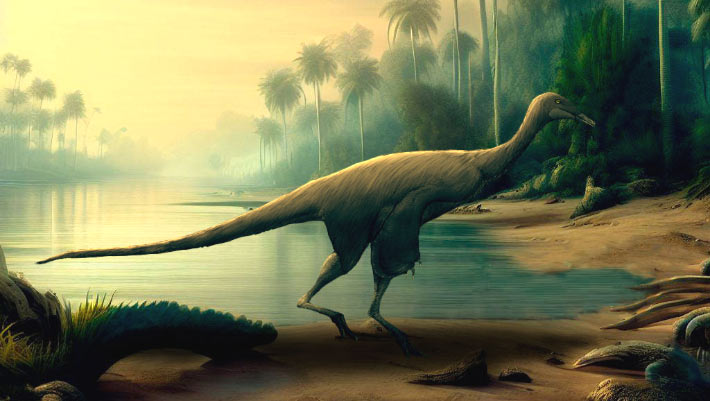Paleontologists from Fukui Prefectural University and the Fukui Prefectural Dinosaur Museum have added another species of theropod dinosaur to the prehistoric catalog.
The newly-discovered species lived in what is now Japan during the Aptial age of the Early Cretaceous epoch, between 121 and 113 million years ago.
Dubbed Tyrannomimus fukuiensis, the species belongs to the dinosaur family Ornithomimosauria.
Ornithomimosaurs first appeared in the Early Cretaceous and persisted until the Late Cretaceous epoch.
They were fast running, omnivorous/herbivorous ostrich-sized theropod dinosaurs.
Almost all of them were toothless, and apparently their jaws were covered by a horny beak; they also had very long legs and arms.
Their fossils are known from Laurasia (now Asia, Europe and North America), as well as Africa and possibly Australia.
“Ornithomimosauria consists of the ostrich-mimic dinosaurs, most of which showing cursorial (running) adaptations, that often exhibit features indicative of herbivory,” lead author Dr. Soki Hattori and colleagues wrote in their paper.
“Recent discoveries have greatly improved our knowledge of their evolutionary history, including the divergence into Ornithomimidae and Deinocheiridae in the Early Cretaceous, but the early part of their history remains obscured because their fossil remains are scarce in the Aptian-Albian sediments.”
The type and referred specimens of Tyrannomimus fukuiensis were found in the Kitadani Dinosaur Quarry of the Kitadani Formation in the northern part of Katsuyama, Fukui, central Japan.
The specimens include two parts of the braincase, several vertebrae and bone fragments.
“In recent years, many isolated ornithomimosaur remains have been recovered from the Aptian Kitadani Formation,” the paleontologists wrote.
“These remains represent multiple individuals that share some morphological features common to them but unknown in other ornithomimosaurs, suggesting a monospecific accumulation of a new…
Read the full article here

